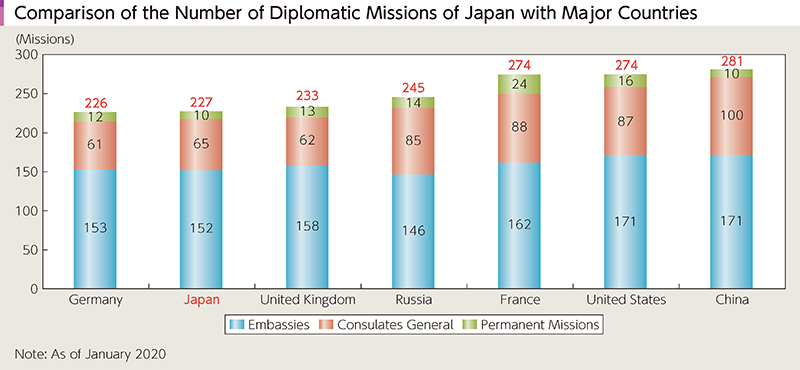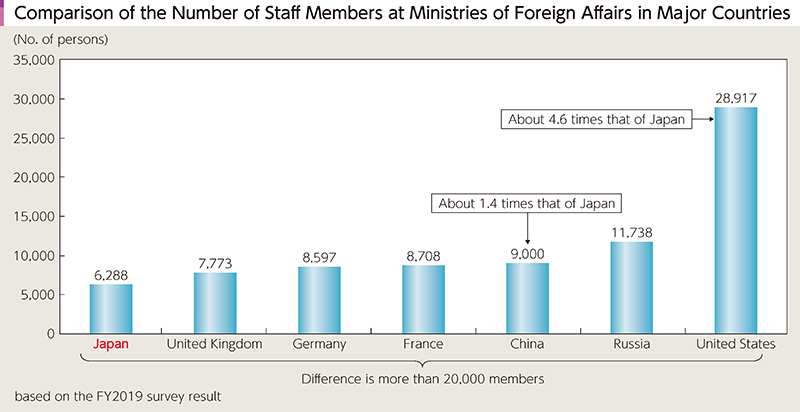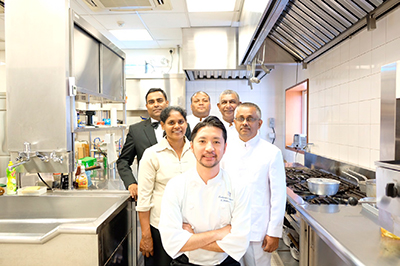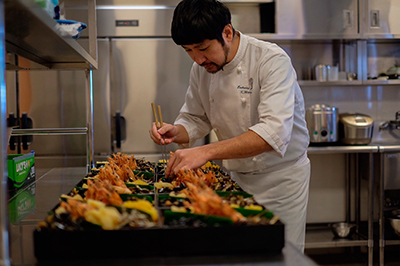Diplomatic Bluebook 2020
Chapter 4
Japan's Diplomacy Open to the Public
2 Strengthening the Foreign Policy Implementation Structure
The security environment surrounding Japan has become even more severe, and diplomatic issues are becoming more complex and diverse as changes in the power balance of the international community accelerate and become more complex. Under these circumstances, MOFA must enhance its foreign policy implementation structure in order to achieve steady outcomes by pursuing “diplomacy with a sense of caring and robustness” to further advance “diplomacy that takes a panoramic perspective of the world map,” and MOFA is reinforcing its organization and personnel at headquarters and overseas missions, including embassies and consulates general.
Diplomatic missions overseas, such as embassies and consulates general, not only represent Japan and promote diplomatic agenda, but also play a key role in areas such as information gathering on the frontline and strategic communication with the public abroad. At the same time, overseas missions are also responsible for operations directly related to enhancing the interests of Japanese nationals, such as protecting their lives and safety, providing support for Japanese companies, promoting investment and tourism, and securing energy and other resources.
In January 2020, Japan established a new embassy in Vanuatu. As a result, the number of diplomatic missions overseas as of FY2019 is 227 (152 embassies, 65 consulates general, and 10 permanent missions).
Vanuatu is a country with great affinity toward Japan, and it is one of the geopolitically important countries in the Melanesian region for gathering and disseminating information. Through opening an embassy in the country, Japan seeks to elevate bilateral relations with Vanuatu to a higher level and strengthen cooperation in the international arena.


A new Japanese embassy in Haiti and a Japanese consulate general in Cebu, Philippines will be established in FY2020. While Haiti has the largest population in the Caribbean Community, it is also the poorest country in Latin America, and interest from the international community over the country remains high amidst its frequently occurring natural disasters. Haiti is also traditionally one of the friendliest countries to Japan that has supported many of Japan's positions in the international arena. Cebu is the second largest metropolitan area in the Philippines after Manilla. In recent years, there has been a significant increase in the number of Japanese companies and travelers, such as tourists and language students in Cebu and the Visayas region at large. It is essential for Japan to strengthen its capacity to protect Japanese nationals and to support Japanese companies by establishing a basis for information gathering on political and economic affairs to deepen its bilateral relations with the Philippines in a multi-layered manner
In addition to establishing more diplomatic missions overseas, it is important to secure and increase the number of staff members to support diplomacy at MOFA and diplomatic missions overseas. In the context of the Government's policy to reduce the overall personnel expenses due to the current severe budget situation, the number of staff members at MOFA was increased to 6,288 (6,173 in 2018) in order to strengthen information gathering and analysis capabilities, vitalize the Japanese economy including promotion of infrastructure exports, further advance strategic communications, bolster security, and address bilateral relations and regional situations. This number, however, remains insufficient in comparison with other major countries. MOFA continues its efforts to build a structure that is commensurate with Japan's national power and diplomatic policy. In the meantime, as enhancing the foreign policy implementation structure remains necessary in FY2020, MOFA will increase its staff members by 70 in order to address important issues, such as protection and safety measures for Japanese nationals abroad as well as information gathering and analysis capabilities, Japan's further economic vitalization including increased infrastructure exports, stronger strategic communications, advancing its diplomacy under the policy of “Proactive Contributor to Peace,” and addressing bilateral relations and regional affairs.


MOFA appropriated a budget of 730.6 billion yen in the budget for FY2019 (an increase of 33.9 billion yen from FY2018) to take on an even more proactive role in diplomacy to lead international initiatives and discussions. The total amount of MOFA's FY2019 supplementary budget was 130.4 billion yen for support for humanitarian, counter-terrorism or social stabilization assistance including refugee issues and, as economic measures, support for global issues such as epidemic diseases and support for promoting inbound tourism.
MOFA's FY2020 initial government budget proposal appropriated 712.0 billion yen based on the following priorities: (1) continuing to protect the international order, based on basic values, from various challenges; (2) promoting active economic diplomacy; (3) strengthening strategic communications and expanding the circle of people with a great affinity toward or knowledge of Japan; (4) actively contributing to solving global issues; (5) supporting the age of large-scale people-to-people exchange on the front lines; (6) fundamentally strengthening the foreign policy implementation structure. In addition to increasing the ODA budget to realize a “Free and Open Indo-Pacific” (FOIP) including Pacific Island countries, the budget for strengthening systems to bolster the international order based on the rule of law was also expanded.
In order to promote Japan's national interests, it is essential to strengthen the foreign policy implementation structure. Japan will continue to proceed strategically to further enhance the foreign policy implementation structure while making efforts to streamline operations.
Miyamura Kosei
 With local staff in the kitchen (Author: Center)
With local staff in the kitchen (Author: Center)I have been working for Ambassador Sugiyama at the Embassy of Japan in Sri Lanka since October 2018, after serving as the Executive Chef for the Ambassador of Japan to Myanmar. Before I became an executive chef for the Ambassador, I had never even travelled abroad, and I had heard a little about this job at the culinary institute. It had never occurred to me that I would be engaged in this line of work. When I first took up the post in Myanmar, I felt uneasy about whether I would be competent enough for the job. However, thanks to the assistance from the Ambassador and Madame, and as well as the warm support of the local staff, I quickly became accustomed to the job and the local environment.
My main job is to offer a hospitable experience to VIPs who have been invited as guests of the Ambassador. The table could be just for two; the Ambassador and a guest. It sometimes can take the form of sit-down dining for more than 20 people or stand-up buffets for 30 to 40 people. Many of the guests are those inconceivable for me to meet in everyday life, including VIPs from the country that I am stationed in, as well as ambassadors of various countries and ministers from Japan, such as the Prime Minister or the Minister for Foreign Affairs. One of the greatest satisfactions I get from this job is having the opportunity to serve the food that I have prepared for them. Most of the guests look forward to having Japanese cuisine, so I put my heart and soul into creating each dish, using locally-sourced ingredients as much as possible while incorporating new preparation methods.
Sri Lanka, like Japan, is an island country, with a wide variety of fish in the markets. When I visit the market to shop for ingredients, I enjoy mulling over ingredients to choose as I imagine what the finished dish will look like.
As this role allows me to take on the responsibilities of buying and preparing ingredients, creating the menu, deciding on the tableware, and choosing the liquors and wines to pair with the food consistently from beginning to end, I find this job very fulfilling and rewarding.
Myanmar and Sri Lanka are a mix of Buddhism, Islam, Hinduism, and so on, and there are different things that the people of each religion cannot consume. This is the most difficult aspect when it comes to thinking about the menu. For example, we cannot serve any animal products to guests who are strict vegans, so I have to serve a soup stock made only from kelp instead of a soup stock made from kelp and bonito.
 Scene in the kitchen
Scene in the kitchenIn addition to serving dishes while taking such precautions into consideration, I also have to pay close attention to the purpose of each and every meal. The objectives that the Ambassador and staff of the embassy wish to achieve through a meal vary depending on each guest and situation. There is no greater joy than to know that I have been able to contribute, even a little, to achieving the objectives through a meal that I was involved in. When I receive praise after a meal, I feel so happy that all the difficulties I had during the preparation of the meal simply melt away. Of course, it would not be possible alone without the cooperation of local staff who prepare and serve the food alongside me. In my everyday work, I prioritize teamwork and pay attention to communication in order to build mutual trust with the local staff who are my working partners.
“Washoku,” Japan's traditional food, has been designated as UNESCO's Intangible Cultural Heritage and is increasingly attracting attention across the world. Bearing that in mind, while doing research on dishes that will delight all the five senses, I will continue to prepare cuisines for the enjoyment of all.
To find out more about the activities of executive chefs for ambassadors/consuls-general of Japan as well as recruitment information, please visit the following website (only in the Japanese language):
https://www.mofa.go.jp/mofaj/annai/zaigai/ryourinin.html


